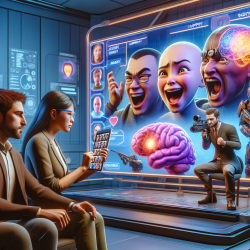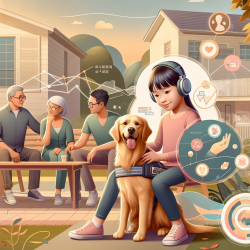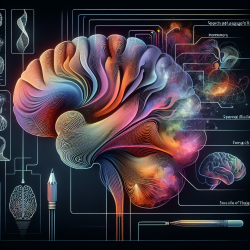Introduction
In recent years, video gaming has become a significant part of the daily routine for many individuals, including children and adolescents. With the increasing prevalence of action video games (AVG), it is crucial to understand their impact on various cognitive and emotional skills. The study titled "The Influence of Action Video Gaming Experience on the Perception of Emotional Faces and Emotional Word Meaning" explores this very relationship, providing valuable insights for practitioners in speech-language pathology and related fields.
Key Findings of the Study
The study utilized both behavioral and event-related potential (ERP) measures to examine the relationship between AVG experience and emotional perception skills. The participants, categorized into AVG experts and amateurs, underwent an emotional word-face Stroop task before and after a one-hour AVG session. The results revealed several important findings:
- Increased Difficulty in Emotional Perception: Both experts and amateurs exhibited increased difficulty in decoding emotional word meanings after the AVG session, as indicated by a more negative N400 component.
- Expert-Specific Challenges: The experts showed an increased N170 amplitude post-gaming, suggesting a greater difficulty in processing emotional facial expressions compared to amateurs.
- Long-Term Gaming Experience: The study found that long-term AVG experience might be associated with an increased challenge in emotional perception, although the relationship requires further exploration.
Implications for Practitioners
These findings have significant implications for practitioners working with children and adolescents, particularly those involved in speech-language pathology and cognitive development:
- Incorporate Emotional Skills Training: Given the potential impact of AVG on emotional perception, practitioners should consider integrating emotional skills training into therapy sessions. This can help mitigate any negative effects and enhance emotional intelligence.
- Monitor Gaming Habits: It is essential to monitor and discuss gaming habits with children and their families. Encouraging a balanced approach to gaming can prevent excessive exposure that might hinder emotional development.
- Further Research Encouraged: Practitioners are encouraged to engage in or support further research to better understand the nuances of AVG's impact on emotional and cognitive skills. This knowledge can inform more effective intervention strategies.
Conclusion
While action video games offer cognitive and entertainment benefits, their influence on emotional perception skills is complex and warrants careful consideration. Practitioners can leverage the insights from this study to enhance their therapeutic approaches, ensuring positive outcomes for children's emotional and cognitive development.
To read the original research paper, please follow this link: The Influence of Action Video Gaming Experience on the Perception of Emotional Faces and Emotional Word Meaning.










